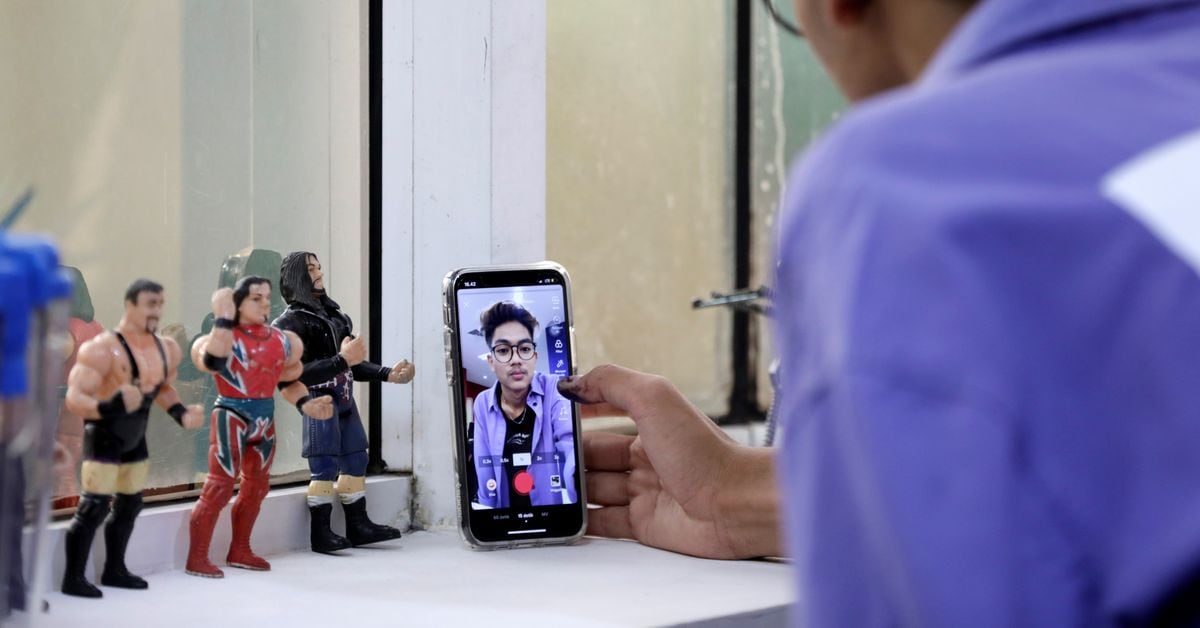Sandy Saputra, 19, who is one of TikTok’s biggest Indonesian stars, uses his smartphone to record a video using the app in Jakarta, Indonesia, July 24, 2020. Picture taken July 24, 2020. REUTERS/Willy Kurniawan – RC2PMI9KGQ5Q Acquire Licensing Rights
SINGAPORE, Sept 28 (Reuters Breakingviews) – June must now feel like an alternate reality to TikTok CEO Shou Zi Chew. Dressed in a traditional batik shirt, he was in Jakarta pledging to invest billions of dollars in Indonesia, seemingly to the delight of government officials, industry executives and consumers. On Wednesday, though, President Joko Widodo’s administration banned e-commerce transactions on social media platforms. ByteDance’s short-form video app business, which boasts 125 million monthly active users in the country, appears to be the main, if not the sole, target.
Trade Minister Zulkifli Hasan told reporters that the regulation, which comes into effect immediately, is intended to ensure “fair and just” business competition and help to protect users’ data. But some lawmakers recently complained about the impact of TikTok’s booming online sales on the country’s 64 million micro, small and medium enterprises, many of which have no online presence. That’s a sizable bloc of votes politicians can’t ignore – and national elections, including for a new president, are less than five months away. TikTok said in a statement that it was “deeply concerned” about the regulation, particularly how it would impact the livelihoods of 6 million sellers and nearly 7 million affiliate creators who use TikTok Shop in the country.
Indonesia is key to TikTok’s hopes of growing its e-commerce sales in Southeast Asia. Despite only starting in 2021, its platform, aided by the company’s core viral videos offering, sold $4.4 billion-worth of goods in the region last year. That could surge to $15 billion in 2023, per research firm Momentum Works, with the archipelago home to 275 million people accounting for roughly half of that. Meanwhile, the company has tried to allay fears it might flood Indonesia with cheap Chinese goods, saying it has no plans to roll out a cross-border business.
There’s a provision in the new rule for that, too, with a minimum price of $100 set for certain imports. That’ll apply to all e-commerce platforms, including Tokopedia, part of local pioneer GoTo (GOTO.JK), which works closely with the large pool of local merchants; and Singapore-based Sea’s (SE.N) Shopee unit, which has been ramping up spending and incentives to retain its dominant market position, despite shareholder opposition. Like TikTok, it mainly relies on beauty and cosmetic sales. For Shopee and others like Alibaba-owned (9988.HK) Lazada, seeing one of their key competitors hobbled seems like a win that may yet get bigger if other governments in the region adopt Indonesia’s approach.
Follow @anshumandaga on X
(The author is a Reuters Breakingviews columnist. The opinions expressed are their own.)
CONTEXT NEWS
Indonesian authorities on Wednesday announced new regulations that bar social media companies from conducting direct e-commerce sales on their platforms. Trade Minister Zulkifli Hasan told reporters that the curbs, which take effect immediately, are intended to ensure “fair and just” business competition. The move is aimed at curbing TikTok’s robust growth in Indonesia, which is home to tens of millions of small merchants who politicians say have been negatively impacted by the ByteDance unit’s integrated app.
Editing by Antony Currie and Katrina Hamlin
Our Standards: The Thomson Reuters Trust Principles.
Opinions expressed are those of the author. They do not reflect the views of Reuters News, which, under the Trust Principles, is committed to integrity, independence, and freedom from bias.
